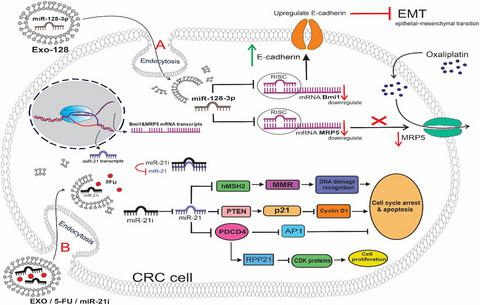当前位置:
X-MOL 学术
›
Chem. Bio. Drug Des.
›
论文详情
Our official English website, www.x-mol.net, welcomes your
feedback! (Note: you will need to create a separate account there.)
Role of exosomal miRNA in chemotherapy resistance of Colorectal cancer: A systematic review
Chemical Biology & Drug Design ( IF 3.2 ) Pub Date : 2021-09-04 , DOI: 10.1111/cbdd.13947 Masomeh Maleki 1, 2 , Asal Golchin 3, 4 , Samira Javadi 5 , Nafiseh Khelghati 3 , Pejman Morovat 6 , Zatollah Asemi 7 , Forough Alemi 1 , Mostafa Vaghari-Tabari 1 , Bahman Yousefi 1 , Maryam Majidinia 8
Chemical Biology & Drug Design ( IF 3.2 ) Pub Date : 2021-09-04 , DOI: 10.1111/cbdd.13947 Masomeh Maleki 1, 2 , Asal Golchin 3, 4 , Samira Javadi 5 , Nafiseh Khelghati 3 , Pejman Morovat 6 , Zatollah Asemi 7 , Forough Alemi 1 , Mostafa Vaghari-Tabari 1 , Bahman Yousefi 1 , Maryam Majidinia 8
Affiliation

|
The third most common malignancy has been identified as Colorectal cancer (CRC) that conducive to death in most cases. Chemoresistance is a common obstacle to CRC treatment. Circulating exosomal microRNAs (miRNAs) have been shown to reverse chemo-resistance and are promising biomarkers for CRC. The capacity of engineered exosomes to cross biological barriers and deliver functional miRNAs could be used to achieve these proposes. The object of this review is the investigation of the role of exosomal miRNA in the chemo-resistance, diagnosis, and prognosis of CRC. Using Preferred Reporting Items for Systematic Reviews and Meta-Analyses guidelines, electronic databases, PubMed, EMBASE, Web of Science, Scopus were searched from January 1990 to November 2020. Ultimately, eight articles included five in vitro (16 cell lines) and three in vivo examinations. Three studies demonstrated that increasing or decreasing mRNA expression was associated with increasing and decreasing cell proliferation in vitro. The presence of miRNA in two studies increased the sensitivity of the drug and exhibited a considerable growth inhibitory effect on cancer cell proliferation. The apoptotic rate was significantly increased in four studies by increased mRNA expression and reduced mrna expression. Tumor volume of xenograft models in three studies suppressed by antitumor miRNA activity. In contrast, anti-miRNA activity in one study decreased the tumor volume. Exosomal miRNAs can be regulators of chemo-resistance and predict adverse outcomes in CRC patients. In sum, exosomes containing miRNAs can be a promising biomarker for the prognosis and diagnosis of CRC. Subsequent research should be a focus on delineating the function of exosomal miRNA before clinical use.
中文翻译:

外泌体 miRNA 在结直肠癌化疗耐药中的作用:系统评价
第三大最常见的恶性肿瘤已被确定为在大多数情况下导致死亡的结直肠癌 (CRC)。化疗耐药是 CRC 治疗的常见障碍。循环外泌体 microRNA (miRNA) 已被证明可以逆转化学耐药性,并且是 CRC 的有前途的生物标志物。工程化外泌体跨越生物屏障并递送功能性 miRNA 的能力可用于实现这些提议。本综述的目的是研究外泌体 miRNA 在 CRC 的化疗耐药、诊断和预后中的作用。从 1990 年 1 月到 2020 年 11 月,使用首选报告项目进行系统评价和元分析指南、电子数据库、PubMed、EMBASE、Web of Science、Scopus 进行了搜索。最终,八篇文章包括五篇体外(16 个细胞系)和三篇体外体内检查。三项研究表明,增加或减少 mRNA 表达与体外细胞增殖的增加和减少有关。两项研究中 miRNA 的存在增加了药物的敏感性,并对癌细胞增殖表现出相当大的生长抑制作用。在四项研究中,通过增加 mRNA 表达和减少 mRNA 表达,细胞凋亡率显着增加。三项研究中异种移植模型的肿瘤体积受到抗肿瘤 miRNA 活性的抑制。相反,一项研究中的抗 miRNA 活性降低了肿瘤体积。外泌体 miRNA 可以调节化疗耐药性并预测 CRC 患者的不良后果。总之,含有 miRNA 的外泌体可以成为 CRC 预后和诊断的有前途的生物标志物。
更新日期:2021-09-04
中文翻译:

外泌体 miRNA 在结直肠癌化疗耐药中的作用:系统评价
第三大最常见的恶性肿瘤已被确定为在大多数情况下导致死亡的结直肠癌 (CRC)。化疗耐药是 CRC 治疗的常见障碍。循环外泌体 microRNA (miRNA) 已被证明可以逆转化学耐药性,并且是 CRC 的有前途的生物标志物。工程化外泌体跨越生物屏障并递送功能性 miRNA 的能力可用于实现这些提议。本综述的目的是研究外泌体 miRNA 在 CRC 的化疗耐药、诊断和预后中的作用。从 1990 年 1 月到 2020 年 11 月,使用首选报告项目进行系统评价和元分析指南、电子数据库、PubMed、EMBASE、Web of Science、Scopus 进行了搜索。最终,八篇文章包括五篇体外(16 个细胞系)和三篇体外体内检查。三项研究表明,增加或减少 mRNA 表达与体外细胞增殖的增加和减少有关。两项研究中 miRNA 的存在增加了药物的敏感性,并对癌细胞增殖表现出相当大的生长抑制作用。在四项研究中,通过增加 mRNA 表达和减少 mRNA 表达,细胞凋亡率显着增加。三项研究中异种移植模型的肿瘤体积受到抗肿瘤 miRNA 活性的抑制。相反,一项研究中的抗 miRNA 活性降低了肿瘤体积。外泌体 miRNA 可以调节化疗耐药性并预测 CRC 患者的不良后果。总之,含有 miRNA 的外泌体可以成为 CRC 预后和诊断的有前途的生物标志物。











































 京公网安备 11010802027423号
京公网安备 11010802027423号